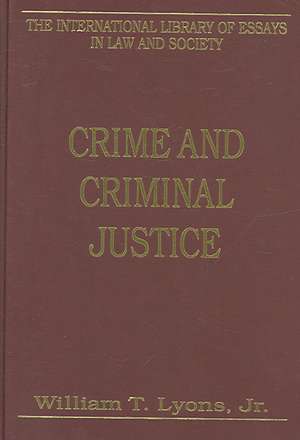Crime and Criminal Justice: The International Library of Essays in Law and Society
Autor J. R. Editat de William T. Lyonsen Limba Engleză Hardback – 6 mar 2006
Din seria The International Library of Essays in Law and Society
- 22%
 Preț: 468.45 lei
Preț: 468.45 lei - 30%
 Preț: 1974.98 lei
Preț: 1974.98 lei - 26%
 Preț: 1836.98 lei
Preț: 1836.98 lei - 30%
 Preț: 1976.37 lei
Preț: 1976.37 lei - 25%
 Preț: 1225.88 lei
Preț: 1225.88 lei - 25%
 Preț: 1473.56 lei
Preț: 1473.56 lei - 10%
 Preț: 311.38 lei
Preț: 311.38 lei - 14%
 Preț: 315.29 lei
Preț: 315.29 lei - 28%
 Preț: 1470.22 lei
Preț: 1470.22 lei - 26%
 Preț: 1098.21 lei
Preț: 1098.21 lei - 29%
 Preț: 1194.72 lei
Preț: 1194.72 lei - 25%
 Preț: 2134.36 lei
Preț: 2134.36 lei - 25%
 Preț: 1476.02 lei
Preț: 1476.02 lei - 28%
 Preț: 1526.30 lei
Preț: 1526.30 lei - 25%
 Preț: 1222.20 lei
Preț: 1222.20 lei - 25%
 Preț: 1054.79 lei
Preț: 1054.79 lei - 26%
 Preț: 1974.96 lei
Preț: 1974.96 lei - 29%
 Preț: 2974.32 lei
Preț: 2974.32 lei - 25%
 Preț: 2830.97 lei
Preț: 2830.97 lei
Preț: 1392.75 lei
Preț vechi: 1844.56 lei
-24% Nou
Puncte Express: 2089
Preț estimativ în valută:
266.54€ • 277.24$ • 220.04£
266.54€ • 277.24$ • 220.04£
Comandă specială
Livrare economică 24 martie-07 aprilie
Doresc să fiu notificat când acest titlu va fi disponibil:
Se trimite...
Preluare comenzi: 021 569.72.76
Specificații
ISBN-13: 9780754625100
ISBN-10: 0754625109
Pagini: 702
Dimensiuni: 169 x 244 x 64 mm
Greutate: 2.9 kg
Ediția:1
Editura: Taylor & Francis
Colecția Routledge
Seria The International Library of Essays in Law and Society
Locul publicării:Oxford, United Kingdom
ISBN-10: 0754625109
Pagini: 702
Dimensiuni: 169 x 244 x 64 mm
Greutate: 2.9 kg
Ediția:1
Editura: Taylor & Francis
Colecția Routledge
Seria The International Library of Essays in Law and Society
Locul publicării:Oxford, United Kingdom
Cuprins
Contents: Series preface; Introduction. Police Powers: Street stops and broken windows: terry, race and disorder in New York City, Jeffrey Fagan and Garth Davies; Theorizing policing: the drama and myth of crime control in the NYPD, Peter K. Manning; The role of procedural justice and legitimacy in shaping public support for policing, Jason Sunshine and Tom R. Tyler; Schools as communities: the relationships among communal school organization, student bonding and school disorder, Allison Ann Payne, Denise C. Gottfredson and Gary D. Gottfredson; Legal cynicism and (subcultural?) tolerance of deviance: the neighborhood context of racial differences, Robert J. Sampson and Dawn Jeglum Bartusch. Racial Profiling: Deadly symbiosis: when ghetto and prison meet and mesh, Loïc Wacquant; Race and place: the ecology of racial; profiling African American motorists, Albert J. Meehan and Michael C. Ponder; Narratives of the death sentence: toward a theory of legal narrativity, Benjamin Fleury-Steiner; Executing Hortons: racial crime in the 1988 Presidential campaign, Tali Mendelberg; Racial typification of crime and support for punitive measures, Ted Chiricos, Kelly Welch and Marc Gertz.The Incarceration Explosion: Ballot manipulation and the 'menace of negro domination': racial threat and felon disenfranchisement in the United States, 1850-2002, Angela Behrens, Christopher Uggen and Jeff Manza; The impact of incarceration on wage mobility and inequality, Bruce Western ; The mark of a criminal record, Devah Pager;Coercive mobility and crime: a preliminary examination of concentrated incarceration and social disorganization, Todd R. Clear, Dina R. Rose, Elin Waring and Kirsten Scully; Why are US incarceration rates so high?, Michael Tonry. Political Challenges: The punishment across time and space: a pooled time-series analysis of imprisonment rates, David Jacobs and Jason T. Carmichael; The politics of punishing: building a state governance theory of American imprisonment, Vanessa Barker; The political response to black insurgency: a critical test of competing theories of the State, Richard C. Fording; Megan's Law: crime and democracy in late modern America, Jonathan Simon; The politics of crime and punishment, William Lyons and Stuart Scheingold; Name index.
Notă biografică
William T. Lyons, Jr. is Doctor and Associate Professor at the Department of Political Science, University of Akron, USA.
Descriere
Focusing on the relationship between law and communities, this volume critically examines the ways that the incarceration explosion, the disproportionate number of African-Americans in American prisons and various forms of racial profiling (policing motorists, juror narratives, campaigns playing the race card, for instance) concentrate disadvantage and make salient political challenges to prevailing understandings of the relationship between crime, punishment, and governance.
